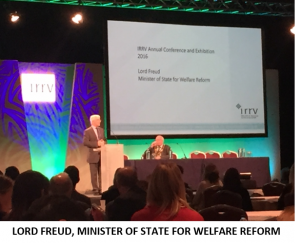 We heard from Lord Freud the Minister of State for Welfare Reform at this year’s IRRV Annual Conference who reminded us that the aim of Universal Credit was to give people back responsibility and control of their lives and to help move them into work.
We heard from Lord Freud the Minister of State for Welfare Reform at this year’s IRRV Annual Conference who reminded us that the aim of Universal Credit was to give people back responsibility and control of their lives and to help move them into work.
He noted that it was a generational change in culture as to how people are helped and paying costs directly to people was a key part of the process. Legacy systems we were told, encouraged disconnection from the world of work and perpetuated benefits dependency. The goal is a revolution in independence, moving people towards saying ‘I pay my rent’.
Timetable
Universal Credit is now available across the country in all 712 job centres and in every Local Authority area. By December it is expected to move towards a wider range of claimants operating in around 50 job centres across the country. Roll out of the full service is expected to be achieved within 5 job centres per month throughout 2017 and will scale up hitting 65 job centres a month from 2018 onwards with the final job centres brought online by September 2018.
The reason for the rather cautious timeline, we were told was down to the massive transformation and the impact this would have on the behavioural effects among the claimant community and the various partners involved in the process. Lord Freud believes it is vital to build on a ‘test and learn’ basis, for something as fundamental as this. 250,000 people we were told are now receiving Universal Credit with 12,500 flowing into the system every month. Lord Freud believes its changing people’s lives for the better, moving them into work more quickly and keeping them in work longer than the legacy approach. He also noted that for every 100 people who would have found work under the existing job seekers allowance 113 are doing the same under Universal Credit.
We were also told that the majority of Universal Credit claimants were comfortable managing their own money and that Universal Support was provided using a series of district partnerships to offer budgeting support, digital services and work coaches. Various trials are also underway with Local Authorities on how best to support people through this period of transition.
The Data Challenge
Lord Freud did acknowledge that one of the key issues faced was around Data and the willingness amongst different organisations to share it quickly and safely to avoid claimants having to continuously repeat their details and circumstances to differing bodies. He referred to the regulations brought in, in 2015 to enable data sharing in the UC process with the goal of giving people personal control of their data, so they have more confidence in the system and can decide who and what they will share.
Housing Issues
He also acknowledged the need to solve housing issues for people first, before asking them to work. Since 2010 we were told that nearly 935,000 people had been prevented from becoming homeless and he referred to the £40m programme to tackle homelessness of which £20m is given to Local Authorities to focus on prevention at an earlier stage.
Lord Freud noted that of course people paying their own housing costs was a big change and required scrutiny, monitoring and evaluation. The housing element of UC is a central part of this evaluation and behavioural effects so far indicated that claimants spent 50% more time looking for a job than under the old system.
Providing another stat he said that 77% of UC claimants were actively looking to increase their earnings compared to just 51% on job seekers allowance. There is also £870m committed to discretionary housing payments.
In conclusion, it appears that the reform continues to move forward albeit cautiously and with careful monitoring.
